CARACAS — One crucial, albeit tacit element in the Venezuelan socialist regime’s narrative is that it needs to portray itself as the hero of its own skewed story. This is something it has been doing since before it took power in 1999.
Every hero needs a villain, and “Supreme and Eternal Commander of the Revolution” Hugo Chávez (actual posthumous title) made sure that the “enemy to defeat” is the United States.
There was a time when this enemy was embodied in the form of former President George W. Bush and even former President Barack Obama (relatively speaking). Currently, former President Donald Trump — and, more specifically, the sanctions he imposed on the regime of socialist dictator Nicolás Maduro during his time in office — remain the revolution’s main scapegoat, someone to blame for our socialism-induced woes.
While Maduro and high-ranking officials in his regime have been subject to a wide array of sanctions in the past decade, those against the state-owned Petróleos de Venezuela (PDVSA) oil company — the only lucrative part, at least legally, of the Venezuelan government — were only imposed in 2019. Since these sanctions actually hurt the regime, it has blamed all of Venezuela’s economic collapse on them. The accusations against Trump for destroying Venezuela ignore that the collapse of “Bolivarian Socialism” was inevitable, caused by the incoherence and corruption inherent in the ideology, and began years before Donald Trump had been elected.
Maduro has personally blamed sanctions for everything his socialist regime has wrought upon this country — even the lack of women’s rights, for example, which the United States has no control over.
Those sanctions are the beast that the metaphorical “hero” Maduro regime seeks to defeat, and as such, the regime has taken it upon itself — perhaps inspired by the trials that former President Trump is currently facing in U.S. courts — to prosecute Trump for his alleged “crimes against humanity.”
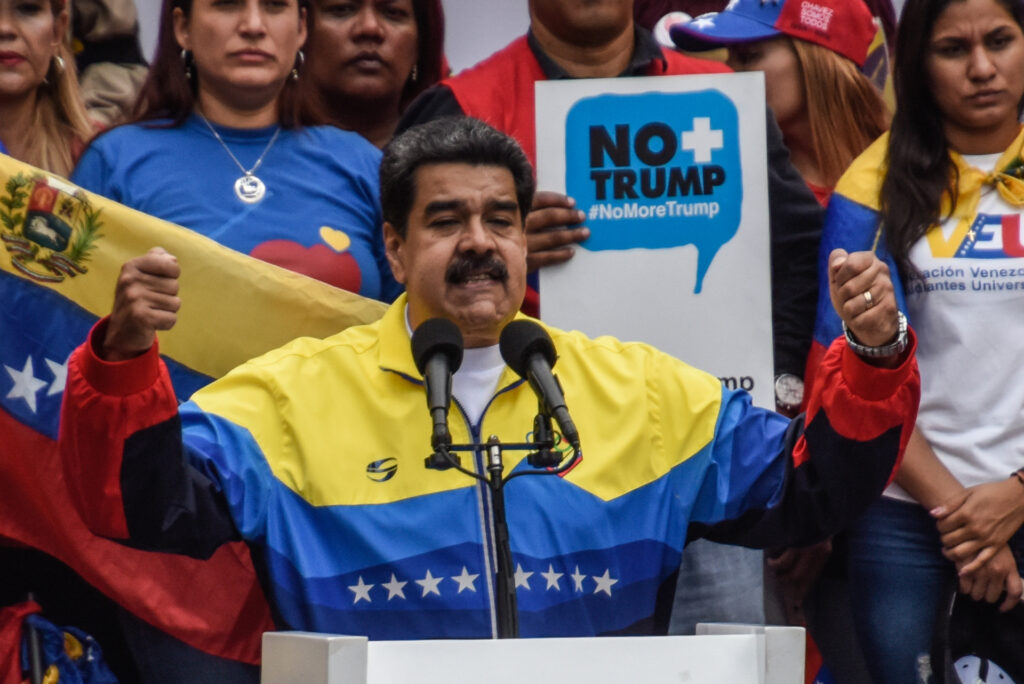
Nicolas Maduro, president of Venezuela, gestures during a speech in an anti-Trump demonstration on August 10, 2019, in Caracas, Venezuela. (Carolina Cabral/Getty Images)
The “crimes” in question are the sanctions, which, in themselves, were a response to myriad human rights violations by the socialist regime against its own people.
The socialist-controlled National Assembly launched a “special commission” on July 6 that is currently “investigating” Trump’s “confession” of his crimes against humanity issued during a campaign rally in Greensboro, North Carolina, in June.
“When I left, Venezuela was ready to collapse; we would’ve taken it over and would’ve gotten all that oil,” Trump said. “But now we’re buying oil from Venezuela, so we’re making a dictator very rich.”
The commission had initially given itself a deadline of a week or so to carry out its “investigation,” but in true socialist bureaucratic fashion, it announced last week that it needed an extra 30 days to reach the conclusion that we all know it will — finding Trump “guilty.”
At home, Trump has faced two indictments, the first by a New York Grand Jury in March and a second in June by federal prosecutors as part of an investigation into his handling of White House documents. He potentially faces up to 400 years in prison if convicted on all charges.
RELATED — “I’M AN INNOCENT MAN!” Donald Trump Responds to News of Indictment in Classified Docs Case
Video Source: Donald J. Trump / Truth SocialAs opaque as the Trump criminal cases at home may be, Venezuela’s socialist lawmakers have yet to figure out exactly what in the country’s penal code Trump will be accused of violating, meaning it is entirely unclear what, if any, sentence he may face if found guilty. The lawmakers have said they plan to “formally denounce” Trump in both national and international courts — meaning the International Criminal Court (ICC) and similar venues — after they conclude their “investigation.”
The “crimes against humanity” case, claiming sanctions in 2019 caused the economic demise of the country, is a farce to those of us who have lived the entirety of the socialist “revolution.” The years between 2013 and 2018 were the worst years of my life, and I’d wager those of most who lived through them in this country.
For those wondering what Venezuela was like before Trump sanctioned PDVSA, in October 2013, I got into a skirmish, let’s say, over toilet paper. Toilet paper shortages were common back then, among many similar sad scenarios as a result of the failures of socialism. It wasn’t my finest moment; I have no shame in admitting that, but after pushing and getting pushed around in a throng of people amidst a cacophony of yells, I did end up securing a 12-roll pack of toilet paper. Definitely worth it.
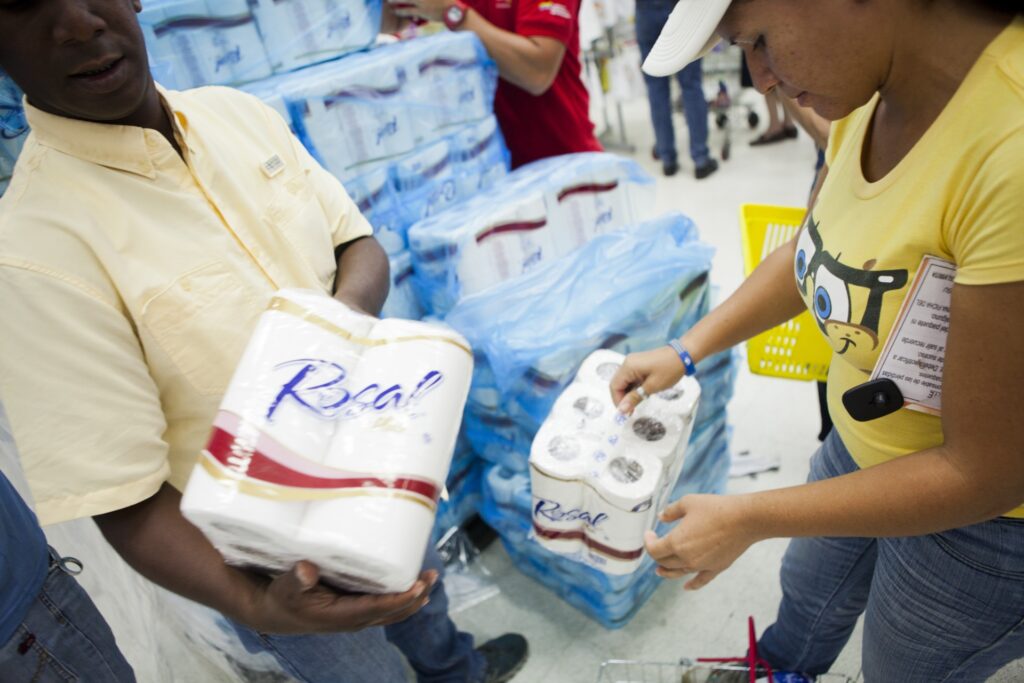
Consumers buy rationed goods during the inauguration of the state-owned Bicentenario supermarket in Caracas, Venezuela, on June 4, 2013. (LEO RAMIREZ/AFP via Getty Images)
“Unique” as that toilet paper wrestling experience may have been, it doesn’t compare to what we went through between 2014 and 2018 because those years were far, far worse. Back then, we had to deal with fingerprint scanners and ID-card-based restrictions in almost every store to ration food, toiletries, and other items. We endured severe medicine shortages that claimed the lives of many, including my mother, and the complete collapse of our currency, the Venezuelan bolivar, with over one million percent inflation by 2018. All of these socialist-made disasters occurred before Trump imposed sanctions on PDVSA in January 2019.
And yet the Maduro regime persists in presenting Trump as the embodiment of the “enemy” it needs to defeat — sometimes literally, as in the case of the government propaganda superhero cartoon Súper Bigote (“Super Mustache”). In it, Maduro plays the titular hero, fighting a caricature rendition of Trump.
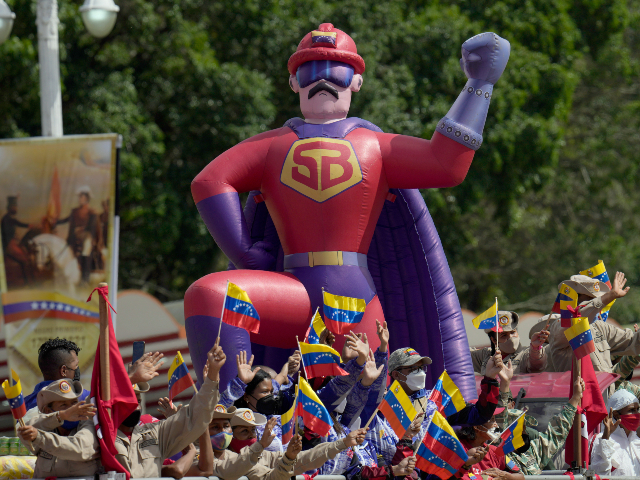
A float with local militia and a blow-up doll of the character Super Bigote, in the likeness of Venezuelan President Nicolas Maduro, participates in the parade marking Independence Day in Caracas, Venezuela, on July 5, 2022. (AP Photo/Ariana Cubillos)
You may be asking yourself, “Why Trump if Joe Biden is the current president?” My guess is that Biden would not have the same impact in a “villain” role for the socialists. Maduro has also received a few concessions from the Biden administration: releasing Maduro’s convicted “narco-nephews” from prison, who had been caught by DEA officials in 2015 attempting to move 800 kilograms of cocaine into the United States; lifting sanctions on Maduro’s nephew and former treasurer Carlos Erik Malpica Flores; and easing the 2019 oil sanctions, which now allows California-based Chevron to produce and export oil from Venezuela to the United States.
Not everything in the Maduro regime’s constant animosity towards Trump is without entertaining moments, though, such as that one time when Maduro tried to send Trump a message in “English” so he wouldn’t need to listen to it through a translator.
It may be rather wild to think about these days, but there was a brief period, days before Trump took office, when Maduro denounced an alleged hate campaign against Trump by international media, adding that Trump’s administration would not be “worse” than Obama’s.
Unfortunately, if there is something I’ve learned over the past years of online “activism” since I started being active on social media about life in Venezuela, it is that such tactics and narratives do work amongst leftists, both online and offline. It would seem like you can get away with committing gross human rights violations and causing the worst migrant crisis in the region’s history so long as you’re the “hero” that’s “fighting against the United States.”
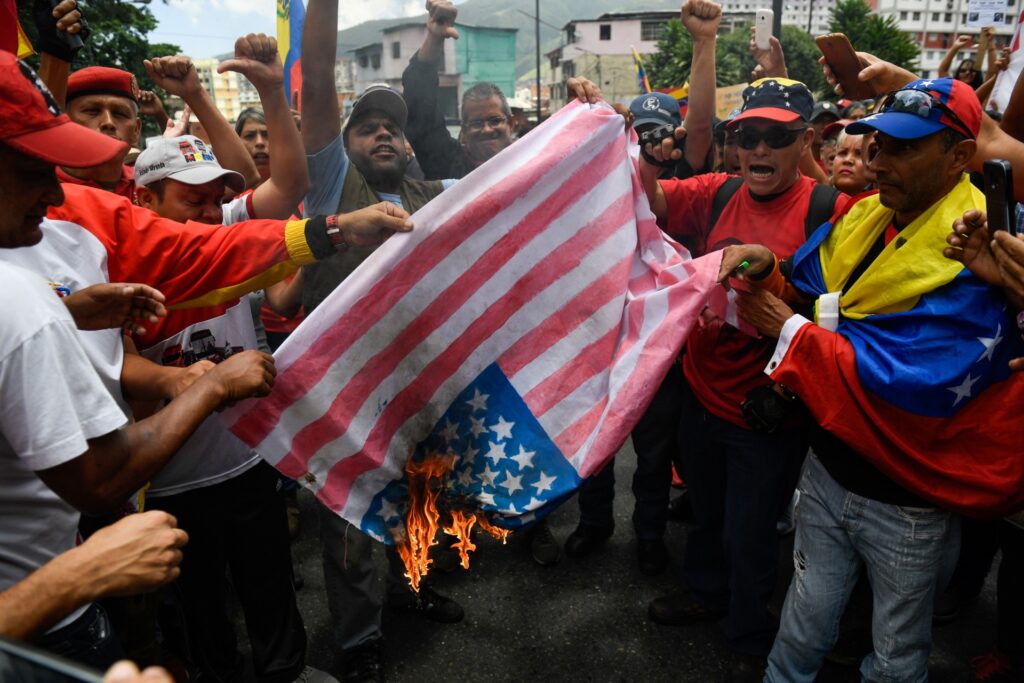
Supporters of the Venezuelan government burn a makeshift U.S. flag during a rally against U.S. sanctions in Caracas, Venezuela, on August 10, 2019. (FEDERICO PARRA/AFP via Getty Images)
As for the Trump case, the former president is unlikely to see time in a Venezuelan prison, but the rhetoric may end up serving as a charade to put dissidents on trial for “treason” for supporting the sanctions. Socialist leaders have already prepared a list of opposition politicians to use however they see fit.
Christian K. Caruzo is a Venezuelan writer and documents life under socialism. You can follow him on Twitter here.
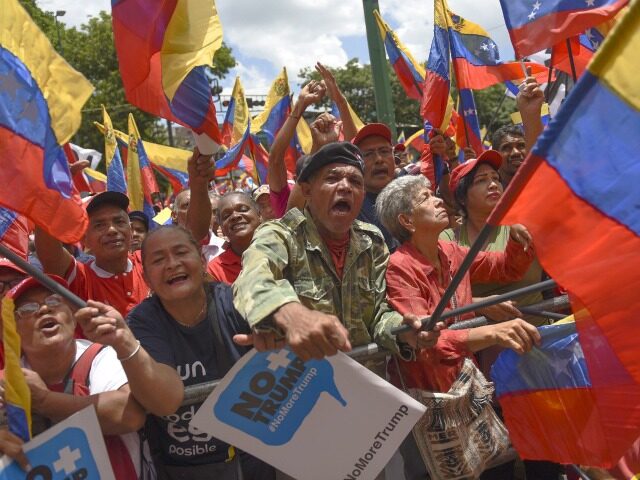
COMMENTS
Please let us know if you're having issues with commenting.